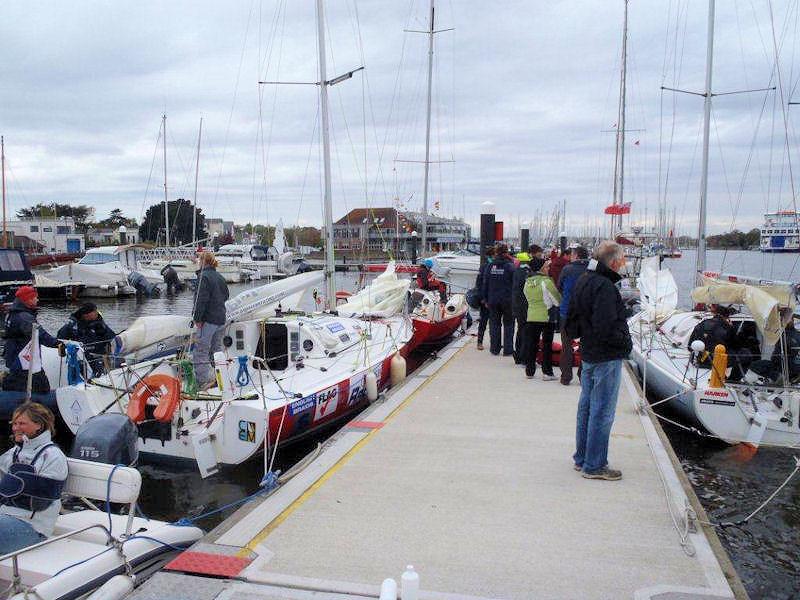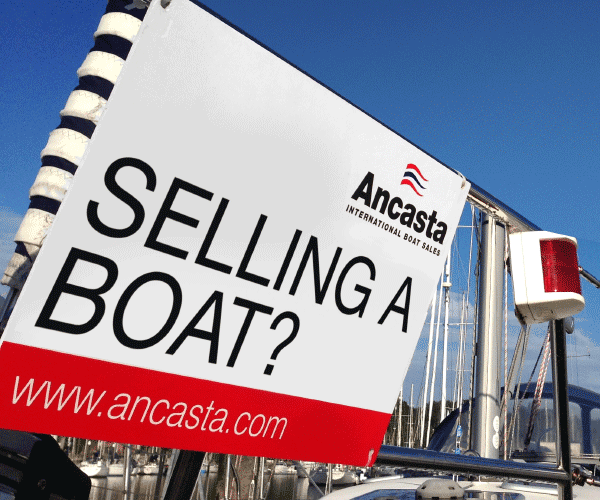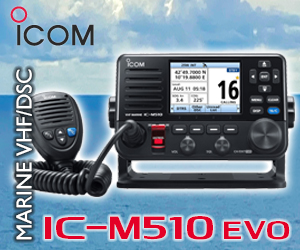
UK Solent 650 at Lymington Town Sailing Club - Overall
by Keith Willis 11 May 2012 14:19 BST
6-7 May 2012

UK Solent 650 at Lymington © Keith Willis
As the mini class grows within the UK and more British boats with active training sessions and interest in the 2013 Transat the latest official mini race on the calendar, the Solent 650 started on the Sunday of the bank holiday weekend.
This new Cat C Two Handed Solent 650 race is a vitally important inclusion to the calendar for British mini sailors providing the opportunity to qualify for the UK Fastnet (a Cat B race) and eventually the Transat without leaving home waters, making the circuit vastly more achievable for the up and coming British mini sailors.
One such sailor who has benefitted from this was Luke Dampier who entered in his Pogo 2 on the first step in his 2013 mini campaign. Dampier said, ‘The timing of this race has been ideal, allowing me to complete most of the miles I need to qualify for the 2013 Transat in the UK, and I can finish off in France later in the year.’
Aside from this important class development as ever the course provided exciting close racing in challenging conditions; spring tides, complex weather conditions and a lot of rain, all to be expected from the South west coast of the UK in May.
The 290 mile course started off Lymington, went east around the Isle of Wight, to a rounding mark at the entrance to Poole Harbour, then Eddystone to Port, Wolf rock to Starboard and finish like so many other classic offshore races on the Royal Western Line in Plymouth.
Keith Willis principle race officer from Lymington Town Sailing Club who himself competed in the 2009 Transat commented, ‘This course compares with the Pornichet Select as one of the hardest courses on the circuit. The multiple tidal gates make it technical and the conditions further west, round start point and then the Lizard can be notoriously narly, hence the inclusion of Eddystone to Port, giving us the opportunity to shorten the course if necessary and keep the boats closer to land.’
From the initial great show of interest only seven boats managed to get their boats to the line, five series and two prototypes including the newly measured home designed and built Mad Dog of Jake Jefferis. Of the skippers and coskippers present, there were two Dutch, two French an Australian and the rest English, there was experience to, four Minitransats (solo across the Atlantic), so the fleet may have been reasonably small but it was quality!!!
The started on time with most boats timing there runs into the start spot on, Becky Scott was fractionally early but quickly returned to correct her error. But it did not seem to do her any harm as she was quickly back into the thick of it.
A closely fought upwind battle against the tide out of the Solent saw the series fleet taking the lead and the Pogo 1 skippered by Andy Oliver and Katrina Ham, happy in the light upwind conditions was first out the Solent; losing the lead shortly afterwards Oliver was forced to retire at Eddystone due to electrical problems.
As night fell and the fleet battled against the tide around the back of the Isle of Wight English Pip Hare, with her co-skipper Dutch Crista ten Brinke both competitors in last years transat, took the lead in Pip’s pogo 2, choosing an inshore route out of the tide and gaining a lead they held for several hours until St Albans head where they broke the bowsprit.
Jefferis proto took the lead from the Jurrasic coast, making easy speed in the reaching conditions and extending an impressive lead when a broken rudder pin caused him to retire from the race and head into Plymouth, leaving just one prototype in the race. Jefferis was awarded a special prize for ‘mini spirit’ as a sailor who on a tiny budget has designed and built his own boat.
Meanwhile the battle for first place in the series became a closely fought two boat race, between Becky Scott, Artemis Academy Elite squad member and her co-skipper Chris Noble, in the Artemis Academy pogo 2 and Hare and Ten Brinke.
Over the second half of the course these two boats battled it out in constant sight of each other and swapping the lead often during a 36hr head to head.
‘It was a tense race,’ commented Pip, ‘it was one thing to deal with the constantly changing conditions, deal with all the tidal gates and keep pushing throughout the course, but to have the added pressure of another boat breathing down your neck all the while adds another dimension.
Leading up to Wolf Rock we were sailing within a couple of hundred metres of each other, covering and sailing with the intensity of an inshore fleet race, after having been already racing for 48 hrs.’
The battle continued to Lizard Point where poor visibility separated the pair in light and fickle winds.
Scott in Artemis took a lead early in the night and continued to build on it while Hare suffering from the loss of her port lower had to make emergency repairs finishing the race under jury rig but still covering the last 45 miles at an impressive speed.
Scott finished in first place series class after an epic 66 hrs and 14 minutes for the 290 mile course, Hare finished in second an hour later.
Scott commented, ‘It was nice to have such a tough race as it really tested out tactics. I couldn’t have wished for a better result! It’s a really positive start to the season and also positive that I know the boat is working and that I am up there with the rest of the competition’
The only French entry to the race, Maxime Sallé and Alan Peyaud won the prototype class and overall in their 2001 Magnen/Nivelt design. Peyaud said, ‘It was an incredible tough race due to the combinations of the weather systems and the currents. We’ll definitely be back next year!’
Luke Dampier and Matt Haslam, new comers to the fleet put in a very promising performance, finishing in 3rd place following a constantly strong race. Luke said, ‘This was my first mini race and it did not fail to impress; it was mentally and physically challenging for both me and my co-skipper,’
While 4th place in the series fleet was taken by Australian Geoff Duniam and dutch co-skipper Ysbrand Ednt in a pogo 2. Both skippers have a long background in the class and two transats between them but this was the first time the pair had raced together. Duniam commented, ‘This was a great race, as hard as any of the other mini races I have done, technically very demanding’
Overall the race was a great success, aided by the incredible hospitality of both Lymington Town Sailing Club and the Royal Western in Plymouth; special thanks go out to the race sponsors, Flag Anti-fouling, Fuel Cell Systems, Barton Marine, IT computers and Harken, all of whom already actively support the mini class within the UK.
The race will definitely be on the mini calendar for next year and Classe mini are investigating how to promote and improve the race, so lots more entries are expected next year. Full position reports and details of next years race can be found at www.mini650.co.uk
Overall Results:
Proto
1st Proto – FRA348 – Maxime Sallé / Alan Peyaud – Winche Club (FR)
Series
1st Pogo 2 – GBR438 – Basecamp (Artemis Offshore Academy) – Becky Scott / Chris Noble – Artemis Offshore Academy
2nd Pogo 2 – GBR743 – The Potting Shed – Pip Hare / Christa Ten Brinke – Lymington Town SC
3rd Pogo 2 – GBR449 – Crean – Luke Dampier / Matt Haslam
4th Pogo 2 – AUS659 – Mad Spaniel – Geoff Duniam / Ysbrand Endt – Lymington Town SC
DNF – Pogo 1 – GBR171 – Andy Oliver / Katrina Ham
DNF – Proto – GBR794 – Jake Jefferis / Lucy Fitzgeorge-Parker
Mini 6.5 an explanation of the class
The class is a development class with very few restrictions on design and shape, referred to as a box rule it has maximum dimensions only, no minimum weight and no controls on sail shape or size other than the height of the mast, apart from a few safety considerations such as righting moment and buoyancy anything goes, movable keels, water ballast, canting rigs etc for their size these boats are ballistically quick, made from carbon and with no creature comforts they are very light, downwind in particular they are quicker than most boats many times their size. There are two groups of boats production and proto, the production boats have a couple of additional rules to keep the cost down (fixed ballast, no carbon). The concept of the class originally came from an English sailor Bob Salmon looking for a cheap/affordable class to do a transatlantic race in, latterly all the drive in the class and the management of it have come from France where numbers of these boats are now huge and most of the racing circuit has evolved around producing a series of races to allow boats to qualify for the biannual mintransat (recently renamed transat650), and despite the fact that these boats are awesome fun to just go for a sail in, it still remains the ultimate goal of most people involved with the class to do the transat, despite the fact that most normal people wonder why you would want to sail a 21foot boat single handed across the Atlantic with no loo, bunks or even the ability to cook proper food (we can boil a kettle - that is all)!! A race which in recent years has always been oversubscribed and incredibly hard for brits to qualify for, usually only sees a couple at most from the UK get to the start line, hopefully the inclusion of this race on the calendar will hugely increase the opportunities for British mini sailors.

